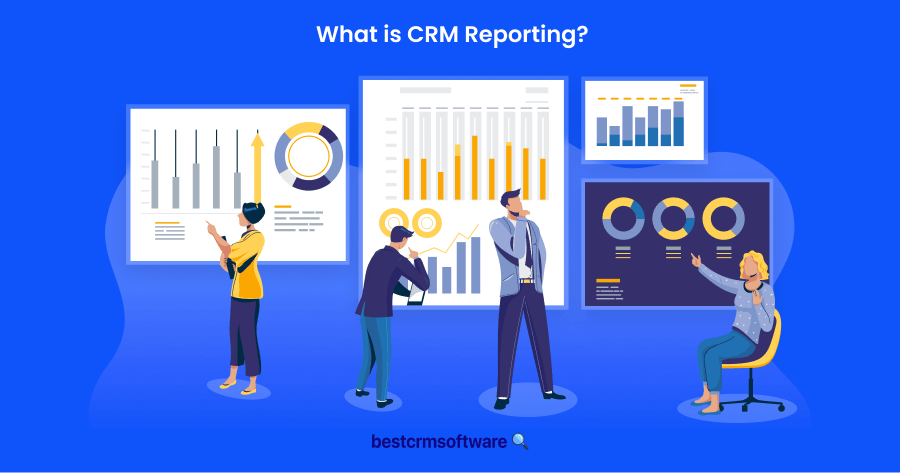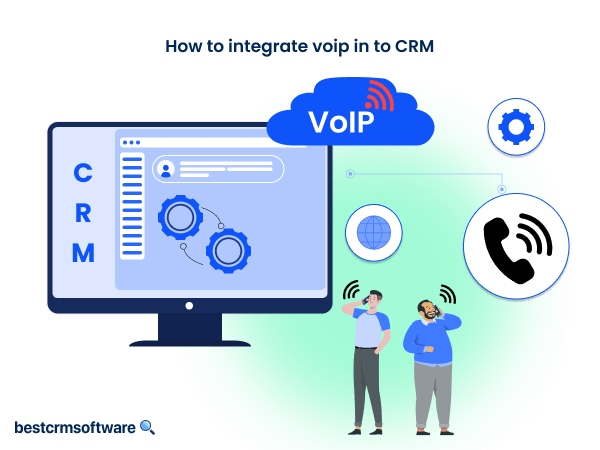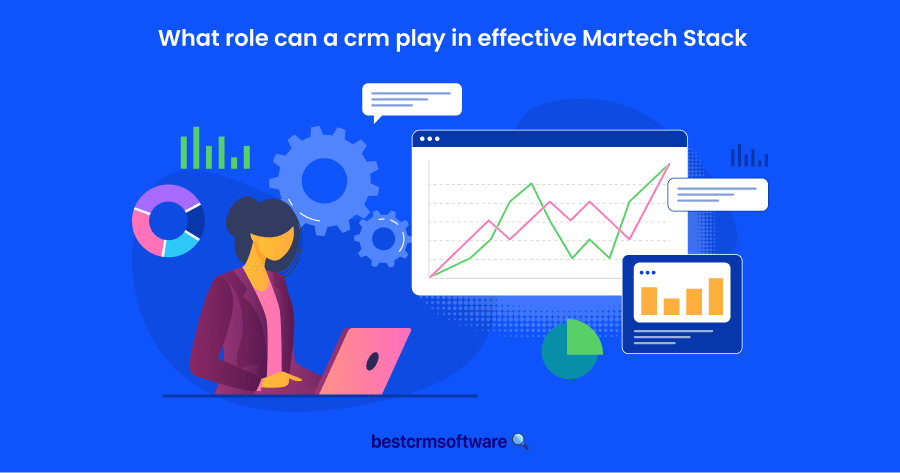
Best CRM Software for Manufacturing
In a Nutshell
I’ve tested and reviewed many CRM software platforms for manufacturing businesses. While some succeed in tailoring their features to these companies’ needs, others fall short. I’ve shortlisted the best tools available to help manufacturing businesses manage their projects, supply chains, and customer relationships.
Best Manufacturing CRM Software Shortlist
- Thryv – Best all-in-one centralized dashboard
- Zendesk Sell – Best sales-focused platform
- Insightly – Best for lead and project management
- Keap – Best for customization and automation
- HubSpot – Best time-saving and budget-friendly option
- Maximizer – Best for basic management of customers
- NetSuite – Best for E-commerce management
Why Manufacturing Companies Need Good CRM Software
Manufacturing companies need top-notch CRM to store customer data, streamline the sales process, and reap the benefits of marketing automation. While improved customer relationships that lead to enhanced sales and retention are the main aim, platforms specifically tailored to manufacturing businesses have other benefits.
A good manufacturing CRM will assist supply chain management, asset tracking, and lead management. Since supply and demand are crucial to the industry, a centralized database for enhanced accuracy is paramount. Other essential considerations for CRM for manufacturing companies are access to production and sales forecasts.
Key features of manufacturing CRM software include:
- Product database
- Quote management
- Order tracking
- Asset tracking
- Opportunity management
- Customer portals
The Top 7 Best CRM Software Solutions for Manufacturing Companies

Why We Like It
Thryv puts everything in one place with a dashboard that gives you an excellent overview of your manufacturing business. The Command Center gives you a centralized inbox where you can check and respond to every lead. No matter how your customers choose to communicate with you, you’ll never miss a message.
The client portal also makes your customers’ lives easier. They can reschedule appointments and upload paperwork without bothering you. The integrations, including Google, QuickBooks, PayPal, Facebook, and MailChimp, are particularly impressive.
Most Important Manufacturing Features
For manufacturing companies, the biggest benefits come from the estimates and invoicing solutions. You can create, manage, and send invoices from the mobile app and save time using templates. The notification for estimate approval and the ability to include digital payment links make your supply chain more efficient.
customers choose to communicate with you, you’ll never miss a message.
Pros
- Easy-to-use centralized dashboard
- Estimate, invoice, and payment processing capabilities
- Marketing automation
- Time-saving client portal
Cons
- Limited customization
- Pricing is flexible, but the full package is relatively expensive

Why We Like It
The full pipeline visibility of Zendesk enhances team productivity and boosts data-driven sales. The deal management and activity tracking features are particularly useful for streamlining administrative tasks so that you can focus on manufacturing quality and lead generation.
The accurate forecasting capabilities and useful analytics make this a top option for manufacturing businesses. Setting targets keeps your team on track, and the ERP integrations enable enhanced planning and productivity.
Most Important Manufacturing Features
The task player feature will play a vital role in manufacturing companies automating routine tasks, especially in the sales process. You can build sales triggers to automate the workflow from initial interest to follow-up after successful order completion. Knowing those tasks are taken care of gives you more time to focus on the supply chain and generate new leads.
Pros
- Pricing that’s scalable and suits different manufacturing business sizes
- Excellent integrations, including ERP software
- Accurate forecasting and advanced analytics
- Custom performance dashboards
Cons
- Lack of onboarding support
- Lacks functionality in quotation and proposal generation

Why We Like It
The advanced product management tools of Insightly make it such an appealing option for manufacturing businesses. This CRM platform makes it easy to convert leads and turn them into projects with a task workflow.
The pipeline management and workflow automation tools boost productivity by providing a clear picture of production and sales and taking the focus off repetitive tasks.
Most Important Manufacturing Features
This CRM for manufacturing companies includes features that tackle the industry’s biggest problems. The data dashboards give you centralized and accurate information instead of silos that create issues between production and sales.
Another aspect that supports the smooth running of the supply chain is inventory management. You can keep a full record of your products, add price books, and initiate quotes. Crucially, it brings a modern marketing approach compared to the solutions that businesses used to rely on. Options to add branding deliver a positive and professional impression to your clients.
Pros
- Dashboard that seamlessly combines sales, marketing, and project management
- Inventory management capabilities
- Multiple automation options
- Focus on brand loyalty
Cons
- Limited reporting functionality
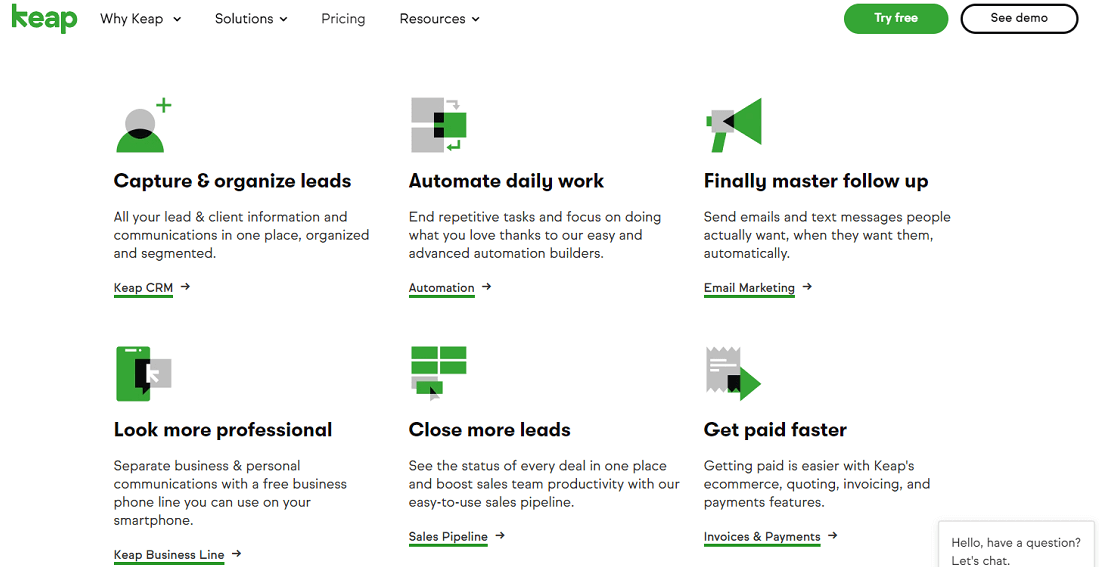
Why We Like It
The options to streamline the sales process make Keap stand out. The mobile app means even your agents in the field can benefit from the centralized data and available actions.
The automation is focused on saving time and not missing a lead, which means this CRM software will significantly impact your conversion and ROI. The fact that it integrates with over 5,000 apps, including e-commerce platforms and ERP, is the cherry on top.
Most Important Manufacturing Features
Keap takes the hard work out of the sales and administration side of manufacturing. You can add ‘pay now’ buttons to invoices, so you get paid faster, and clients have a better experience. The sales forecasts and the ability to track receivables are particularly useful for supply chain management.
Pros
- Over 5,000 integrations
- Invoicing, payments, sales forecasts, and marketing in one place
- Excellent app
Cons
- Scalable pricing but quite expensive

Why We Like It
HubSpot is an affordable option that’s also user-friendly. The focus is on sales and marketing efforts in a way that can really save manufacturing businesses time. One of the most impressive aspects is how easy it’s to customize the dashboards.
You can stay up-to-date on your sales pipeline, set quotas, and track your performance. Plus, the lead capture tools mean your company will quickly reap the benefits.
Most Important Manufacturing Features
If you’re new to adding a CRM to your manufacturing business, it’s the ideal tool to streamline processes without a steep learning curve. The timeline brings all your notes, interactions, and customer data together, meaning you don’t have to jump between three or four different programs.
Pros
- Excellent free plan
- Incredibly user-friendly
- Tailored to boost efficiency and productivity
Cons
- Lack of inventory management tools
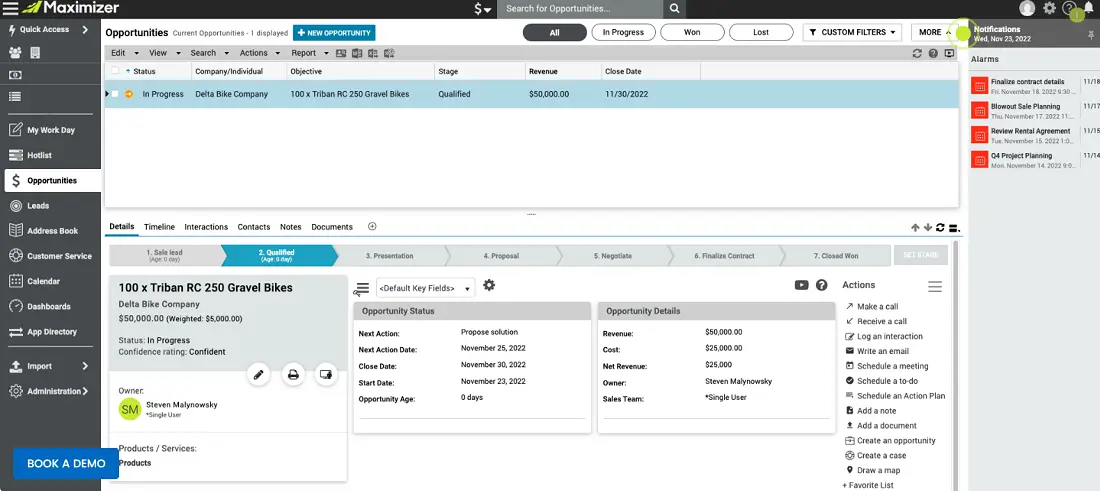
Why We Like It
This cloud-based CRM software is packed with tools to help you manage marketing, sales, and customer service. Its focus is on productivity, with revenue growth as the goal, which is ideal for a manufacturing company looking to develop.
The lead generation feature promotes growth, while the improved engagement will appeal to existing customers. Real-time action tracking increases your efficiency. Plus, there’s a functional app that means you can access crucial customer data anytime and anywhere.
Most Important Manufacturing Features
The supply chain is much easier to manage when you can use your forecasts to set objectives and use in-depth insights to inform them. The advanced reporting capabilities of this CRM platform give you an overview and allow deep dives into company performance and efficiency. The targeted follow-ups mean you can stay ahead of the competition with better customer service and fewer missed opportunities.
Pros
- Useful goal-setting and tracking tools
- Deep insights and customized reporting
- Accessible app
Cons
- Pricing structure hinders scalability

Why We Like It
This CRM is actually a business management suite, which means it offers ERP and e-commerce in one solution. The CRM side of the platform enables partner-focused sales through its real-time information flow.
The sales forecasting feature and pipeline management are invaluable tools in increasing customer satisfaction. The knowledge-sharing aspect of collaboration is particularly important for manufacturing companies, as accurate and centralized data is a game changer.
Most Important Manufacturing Features
The bonus of having your CRM and ERP on one platform is a significant plus point for manufacturing businesses. You can manage resources, sales, communication, and marketing without switching to ten different windows.
The configure, price, and quote tool makes automating sales proposal generation fast and efficient. Plus, it can connect to inventory and profitability data for a comprehensive overview.
Pros
- Annual license fee with flexible optional modules
- Comprehensive business suite with ERP and CRM
- Focused on productivity and supply chain management
Cons
- Steep learning curve to make the most of functionality
Considerations for Small vs Large Manufacturing Companies
The best CRM for manufacturing isn’t a one-size-fits-all product. The software you choose will depend on the size of your business and its needs. For example, smaller manufacturing companies might not have large sales and marketing departments. In that case, marketing automation and organizing customer data will be a higher priority.
For a larger manufacturing business, centralizing data, improving the sales pipeline, and boosting productivity will be more important. Collaborative and knowledge-sharing features will play central roles in helping your business and its sales process. If you have a lot of products with many configurations, custom pricing and invoicing options will also be a priority.
Final Thoughts on CRM Software for the Manufacturing Industry
The best CRM for manufacturing combines streamlined sales with an emphasis on productivity and efficiency. A focus on inventory and pricing that facilitates allocating resources is one of the key features you can expect. However, you can choose a CRM that focuses on sales and marketing and integrates with your existing ERP to give you a more flexible solution.
The good news is that there are several excellent options out there. There are affordable and scalable options on our list to suit every kind of manufacturing business.
FAQ
-
1) Do manufacturing CRMs have industry-specific features?Most manufacturing CRMs have a sales, marketing, and customer service focus. As those are essential parts of the manufacturing business, a tool doesn’t have to be industry-specific to be useful. If you want a more comprehensive solution, you can look for manufacturing features, such as inventory tracking, pricing, and supply chain management.
-
2) How do manufacturing CRMs boost productivity?One key way CRMs boost productivity is through accurate data and sales forecasts. You get complete visibility of your sales pipeline, which is communicated to multiple departments so you can plan your production schedule and allocate resources efficiently.
-
3) Why are CRMs important in manufacturing?CRMs are invaluable tools for tracking information, streamlining the sales process, and automating repetitive tasks. That allows manufacturing businesses to focus on new leads, customer satisfaction, and quality production.

















